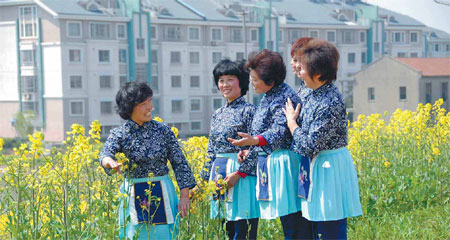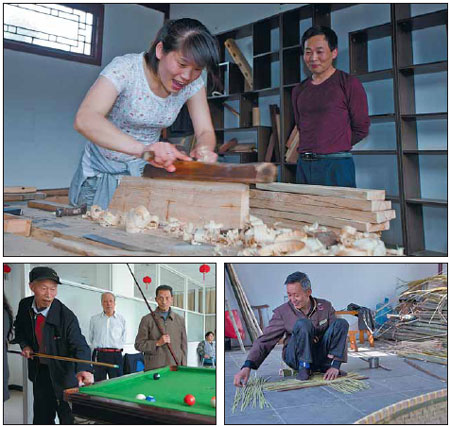Moving from the outside in
( China Daily )
Updated: 2012-06-07
|
|||||||||
|
Villagers sing folk songs, which have been passed down for hundreds of years in the Heyang Mountain area in Zhangjiagang. Provided to China Daily |
|
Clockwise: A tourist tries a hand at shaving wood under the instruction of a Yonglian villager. A Yonglian villager surnamed Chen weaves bamboo wares. Elderly people in Yonglian enjoy billiards. Photos by Gao Erqiang / China Daily |
Zhangjiagang's government is innovating policies to transform its migrant workers into 'new citizens'. Chen Jie and Erik Nilsson report in Zhangjiagang, Jiangsu province.
Fan Huiping has seen both sides of migrant life. He joined the exodus of workers who left Jiangsu province's Zhangjiagang city in the 1980s, when it was a poor farming settlement. He now lives among the 600,000 migrants who flock to his hometown-turned-boomtown, where the average annual per capita GDP is about $23,000 - 4 times the national figure. That's why he supports the city government's New Citizens Initiative, which seeks to better balance privileges enjoyed by migrants - whom the city instead calls "new citizens" - and locals.
"Because I worked outside, I know the hardship," he says. "We need migrant workers. We must trust and help them."
Fan, who was born in Yongshun village, says he's also happy to see local rural and urban hukou (residency permits) equalize. In some cases, distinctions are completely erased by the city's experimental "jiating" (family) hukou.
Fan followed his brothers to Shaanxi's provincial capital Xi'an to work as a tailor for 16 years until his return in 2001. "People here couldn't afford school in the 1970s and '80s," Fan recalls. "My parents and their generation didn't believe education was important. They thought we should learn a trade, work outside and send money home."
But Fan believes his 16-year-old son needs more. "I know how important study and degrees are," Fan says.
"That's a mindset shift."
Decades ago, entire villages would work in one trade. Fan's concentrated on tailoring, while his wife's became drivers. It was virtually unheard of for a woman - especially from the countryside - to learn to drive when she started in 1987. Their household can earn about 13,000 yuan ($2,000) a month - several times more than cabbies in mega-cities.
Fan was able to swap his rural hukou for an urban one when he bought a downtown house in 2002. "But I don't sense much difference between urbanites and villagers anymore," he says.
According to tradition, his parents should have given him a home when he married in 1994. But his brothers already shared the four-room, two-story house his parents constructed. And the rural-urban integration policy forbade farmers from building.
"The rule changed later, but I had to buy an apartment," Fan says. He purchased a 102-square-meter apartment for 80,000 yuan. He later traded that for a 300,000 yuan 190-sq-m dwelling. He paid with money given by his parents and lent by his brothers, whom he later successfully sued for his share of their house.
"Even though they live in the village and I live in the city, our standards of living are about the same," Fan says. "But I earn more because I returned earlier and started driving."
He recalls there were no official cabs when he and his wife, Song Huafang, returned after starting to drive in Xi'an in 1998. "We had little money back then," Liang says. He got a better car in 2000 and traded up again in 2003, when he borrowed 400,000 yuan for the car and taxi license.
Zhangjiagang now has nearly 500 registered cabs. With the city's development and policies favorable to migrant workers, some, like Dai Weidong, have found prosperity unlikely elsewhere. Dai never imagined his family could earn 100,000 yuan a year when he arrived from Jiangsu's Lianshui in 1994 at age 24. He earned 7 yuan a day doing odd jobs. "I came because my parents were sick," he says. "Our living conditions were dismal. It was hard."
He left school to work in the fields before a friend told him there were jobs in Zhangjiagang. Dai landed a position at Zhangjiagang City Huagongjixie Factory and was made a permanent employee with a 300 yuan monthly salary within six months. "I worked hard, studied on my own at night and impressed the boss," he recalls.
Because Dai had dropped out of his third year of middle school, he worried he didn't have the necessary qualifications.
"Zhangjiagang offered a dream but I didn't know how to make money without skills," he says.
So, Dai compensated for his lack of formal education with self-study. He excelled to the point he was the only migrant worker representative from Jiangsu among 1,000 nationwide awarded at the Great Hall of the People in 2008.
Dai's wife, whom he married in 1990, also works at the factory, which has grown from a plant of 200 to a listed limited liability company with 3,000 employees and its own dock.
The company gave him a 30-sq-m apartment in 1998 and a larger two-room apartment later. Dai bought a 143-sq-m apartment in 2007. While Dai's life got better, he also saw Zhangjiagang, which started its development strategy in 1962, transform into what many hail as "rural China's future". He hopes his son, who studies at a normal university in Jiangsu's Huai'an city, will move to Zhangjiagang.
"I still worry about my hometown," he says. "It's still not so rich. I hope it can catch up with Zhangjiagang." But that would require a mindset shift, he says. "Zhangjiagang is more advanced and realizes money is just one side of development," he explains. "People should also volunteer, observe social responsibility and pay attention to education. That's a different form of development."
But Zhangjiagang's reincarnation didn't happen overnight. Wang Yutian, who left Zhangjiagang to become a tailor in Liaoning province's Dalian city in 1984, says change was difficult. "Farmers' houses were messes," Wang says. "They would move into new buildings but keep old habits. They didn't tidy up and wouldn't throw anything away because it might be useful later. The transformation took time."
Wang returned in 2000 to open restaurants and then a logistics company. Since 2006, he has run a home repair hotline service in an industrial park. Such hotlines are common in Zhangjiagang and help with anything from a broken water heater to a domestic dispute. Having worked as a migrant and possessed a rural hukou before he got a "family" residency permit, Wang says he appreciates migrants' contributions to his hometown.
"Without migrants, we couldn't have developed so fast," he explains.
Migrant worker Liang Jingquan, who runs the same kind of business as Wang, agrees. "Every city needs migrants. The term 'new citizen' sounds more like a family member than an outsider. That's good. Migrants should be treated like family - not just service providers."
Liang got a Zhangjiagang hukou when he bought a 42-sq-m house for four people in 2003 for 200,000 yuan.
"Before I had the hukou, I didn't have social security or health insurance," Liang says. "Previously, your son was your insurance. Now you can get it from the government."
Liang moved to the city in 1990 at age 21. After toiling in textile plants, he opened a supermarket in 1996. When he realized local people were buying more cars, he opened a carwash. The Happy Harvest repair hotline service he founded in 2006 now employs 12 "new citizens". He believes it would be difficult for his hometown to replicate Zhangjiagang's model.
"If a rich man invests in my hometown, I'm not sure it could pay off like it has in Zhangjiagang," Liang says. "Think of industries as clothes and cities as people. A poor person with only one set of clothes doesn't have a choice - even if those clothes are dirty rags, he still has to wear them. But a rich man can choose from several sets of clothes. In the same way, my hometown must take whatever industry it can get, even if it pollutes, while Zhangjiagang can choose."
Northern Jiangsu, where Dai and many migrants in Zhangjiagang come from, is poorer, and southerners often look down on his ilk, he says.
"Fewer people look down on us now. I don't feel like an outsider anymore. I feel like a new citizen."
Contact the writers at chenjie@chinadaily.com.cn and erik_nilsson@chinadaily.com.cn.









